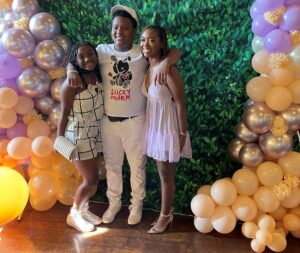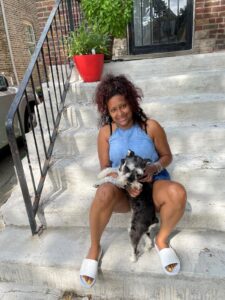
Chaunelle Caver-Perkins and her family will be among the guests at the 35th annual Hope Through Caring Gala this Saturday, Feb. 18. You can support the ALS research, education and clinical care described below by participating in our silent auction. Online bidding opens Feb. 15!
At only 40 years old, Chaunelle Caver-Perkins was not ready to slow down. Not when there was a cheer competition or a baseball game on the schedule – which there always was.
“My youngest daughter Tamia has been cheering since she was 5 years old. She’s now 13 and competes as an elite cheerleader,” says Chaunelle. “She participates in six competitions a year and travels a lot. I always drove her to and from practice, traveled with her to competitions, and did her hair and make-up.”
Her son Sean’s high school baseball team also had this mother of three on the road a lot.
“During my son’s baseball games, I used to jump up and down and cheer him on from the sidelines,” says Chaunelle. “Between Tamia’s cheer commitments and Sean’s baseball, I was so busy. There was one point where I had traveled to 13 or 14 states in one month!”
Chaunelle first started noticing strange symptoms while she was getting ready for another busy summer.
“I noticed that I was getting weaker, and my arm was hurting,” says Chaunelle. “But what really got me to go to the doctor was that I was no longer able to open a pants hanger to save my life. I had always been strong, especially when it came to unscrewing things and opening things.”
After a visit to a neurologist, she was diagnosed with ALS in 2020 before being referred to the Lois Insolia ALS Clinic at the Les Turner ALS Center at Northwestern Medicine. The disease is currently affecting her fine motor skills and upper body, forcing her to step back from some of her children’s activities.
“I miss the little intimate moments with my children that I can no longer do – like touching Tamia’s face when I’m applying her make up or braiding my oldest daughter Kyla’s hair. I can no longer jump up and down and project my voice from the sidelines of my son’s games like I used to,” says Chaunelle.

«I don’t want my kids to feel like they are being judged because of my condition. My kids are doing the best that they can, “says Chaunelle. “I’ve been trying to get them into some form of counseling but it’s hard to convince the younger ones. It’s got to be hard for them to have a mom who goes from doing everything for them to watching her gradually deteriorate in front of their eyes.»
“When I used to drive Tamia to cheer practice, we did this thing called ‘open table’ where I gave her an open space to just talk freely without any judgement. I also did it with my son. I still do it with them, I just no longer do it while driving.”
As hard as she tried to keep in touch with what they were feeling, though, Chaunelle says she didn’t really know what her children were going through until she read Sean’s college entrance essay, which discussed his personal struggles in dealing with his mother’s ALS diagnosis.
“In his essay, Sean said that he was initially in denial because he didn’t clearly see in me the physical changes that occur when someone has ALS. The reality of the diagnosis didn’t hit him until I stopped driving. That is when he started wondering, ‘What do I do now?’” says Chaunelle. “Although his essay was very touching, it was very hard for me to read.”
Fortunately, Chaunelle has the support of her tightknit family to help her and her children as she goes through this difficult journey, as well as regular meetings with the Les Turner ALS Foundation’s ALS support services coordinator Easton Stevenson, LCSW. Chaunelle is also channeling her energy into volunteering with the Foundation’s Support Services Committee.
Led by several people living with ALS and caregivers, the Support Services Committee develops and reviews resources like the ALS & Children guide, which offers insights into how children are affected by ALS and caregiving, as well as support for how to have those difficult conversations. It’s one of many online resources designed to provide answers and encouragement to people living with ALS, their families and loved ones every step of the way.
“Being diagnosed with ALS has changed my world. Some would say for the bad because it’s such a horrible disease, but I believe it’s changed my life in some ways for the good. I have learned to live life to the fullest and to make lifetime memories for my family,” says Chaunelle. “Yes, I do miss my old life and being independent, but I am embracing my life as it is today and making sure to stop and smell the roses.”

